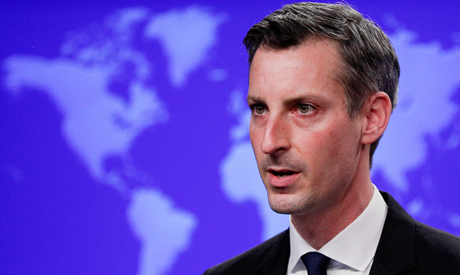
U.S. State Department Spokesman Ned Price speaks to reporters during a news briefing at the State Department in Washington, U.S., March 1, 2021. REUTERS
The US continues to support efforts seeking to reach an agreement between Egypt, Sudan, and Ethiopia over the long-running dispute caused by the Grand Ethiopian Renaissance Dam (GERD), US State Department Spokesman Ned Price said in a press briefing on Monday.
When asked about the latest updates on US involvement in the GERD negations, Price said “Not since we last spoke about this. We’ve talked about our decision to de-link certain assistance on Ethiopia from our policy on the GERD.”
“We continue to support collaborative and constructive efforts by Ethiopia, Egypt, and Sudan to reach an agreement on the GERD,” he noted.
In September, former US President Donald Trump’s administration suspended aid to Ethiopia over the filling of the reservoir of its disputed dam last summer despite a lack of agreement with Egypt and Sudan.
However, Washington announced in February — days after Joe Biden officially assumed the office — it will de-link its pause on some aid to Ethiopia from its policy on the controversial Blue Nile hydropower dam, saying the resumption of assistance will be assessed on a number of factors.
In a press briefing last month, Price told reporters that these factors will include “whether each paused program remains appropriate and timely in light of developments in Ethiopia that occurred subsequent to the pause being put in place.”
The temporary pause on certain US foreign assistance to Ethiopia affects approximately $272 million in development and security assistance to Ethiopia.
Price noted that President Joe Biden’s administration will review US policy on the GERD and will assess the role the administration can play in facilitating a solution between the countries.
Last year, Washington attempted to mediate a negotiated agreement between the three countries but failed after Addis Ababa refused to sign on a draft deal.
The US Treasury Department and the World Bank hosted more than one round of tripartite talks from November 2019 until February 2020, before Ethiopia withdrew from the last session of talks and refused to sign on any binding deal.
The US has also been acting as an observer in the currently stalled African Union (AU) sponsored tripartite negotiations, which have started last summer. The AU talks have not yet reached an agreement on the outstanding points related to the filing and operation of the dam.
Ethiopia says the massive project, which it hopes will make it Africa’s largest power exporter, is key to its development efforts, a matter that neither Egypt nor Sudan oppose.
Egypt fears the project will significantly cut its crucial water supplies from the Nile River, while Sudan has concerns on how the reservoir will be managed.
There is an endeavor still in the making to revive the AU-sponsored talks, spearheaded by Sudan and backed by Egypt, to form an international quartet committee comprising the US, the European Union, the United Nations, and the African Union to mediate the negotiations.
The efforts to resolve the crisis come amid worries over controversial plans by Addis Ababa to complete the second filling in July without reaching an agreement with Cairo and Khartoum first.
Short link: